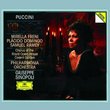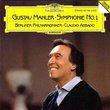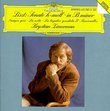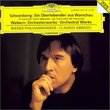| All Artists: Sergey Prokofiev, Emerson String Quartet Title: Prokofiev: String Quartets Nos. 1 & 2; Sonata for 2 Violins Members Wishing: 0 Total Copies: 0 Label: Deutsche Grammophon Release Date: 4/14/1992 Genre: Classical Style: Chamber Music Number of Discs: 1 SwapaCD Credits: 1 UPC: 028943177221 |
Search - Sergey Prokofiev, Emerson String Quartet :: Prokofiev: String Quartets Nos. 1 & 2; Sonata for 2 Violins
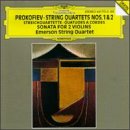 | Sergey Prokofiev, Emerson String Quartet Prokofiev: String Quartets Nos. 1 & 2; Sonata for 2 Violins Genre: Classical
|
Larger Image |
CD DetailsSimilar CDs |
CD ReviewsExtraordinary in every detail D. B. Rathbun | Washington, DC United States | 06/20/2000 (5 out of 5 stars) "As are just about any performances by the Emerson Quartet, these renditions of the Prokofiev quartets are outstanding. The playing is intelligent, well integrated, and reveals an immense sense of landscape over the entire pieces by each member of the quartet, and by the quartet as a whole. The recording engineering is above average for Deutsche Gramophon--warm and well balanced. The music is easily some of Prokofiev's best, and sure to please anyone who likes Prok. but is not familiar with these works. They have a lot of energy and beauty." 20th-Century Chamber Music Unafraid of Charm Karl Henning | Boston, MA | 07/11/2002 (5 out of 5 stars) "The twentieth century in Western music did not know quite what to do with Prokofiev, and so, it largely ignored him.Yet, it is clear that he was one of the century's pre-eminent composers, a master, and to ignore him ultimately reflects worse on those who overlooked him. Like Sibelius, Prokofiev both drew great draughts from the well of Tradition, and yet clearly spoke with his own voice. The gigantic stature of these two composers, together, is not quite convenient to the `musical progressivists,' who would maintain (a little naively, and quite inartistically) that greatness in Art is contingent upon some notion of "progress."Prokofiev had the further disadvantage of following Stravinsky's astonishingly strong lead; he essentially followed Stravinsky to Paris, trying similarly to make his name via Dyagilev's Saisons russes. But (among other factors) a string of misfirings with Dyagilev's company, and that small matter of Prokofiev having a musical personality of his own (rather than being a clone of Stravinsky who, all question of his undeniable greatness aside, could practically do no wrong so far as the French were concerned), made Prokofiev's going slow, as he sought to establish himself outside of Russia.Prokofiev was not Schoenberg or Bartók, either; and these two well-wrought string quartets have unfairly been given short shrift for their obvious dissimilarity against the monumental output of the Austrian and the Hungarian in the medium of the string quartet. (The tone of Prokofiev's work is perfectly distinct from Bartók's, even where the former uses folk materials, as in the second quartet.) But, as with Prokofiev's marvelous pair of Violin Sonatas, these two quartets are masterfully constructed, brilliantly conceived for the instruments and ensemble - in short, they are perfect musical statements, and everything that Prokofiev had to say musically, he said with grace and charm, whether writing for the symphony orchestra, or for piano solo, or for any chamber combination in between.The Sonata for two violins is a lovely bonus on this disc. The astonishing thing about this piece is how Prokofiev manages, with only two musicians, to conjure echoes of some of the textures in his orchestral works, especially in the opening Andante cantabile; the musical fabric is beguilingly rich for a mere duet. The third movement. Commodo (quasi allegretto) is signature Prokofiev, tender nostalgia sometimes tinctured with desolation. This is a minor work, with a big spirit." Very good, if a bit too polished Frederick T. Williams | San Francisco, CA United States | 09/08/2005 (4 out of 5 stars) "Like all performance recordings produced by the Emerson Quartet, this recording of two unjustly neglected masterpieces gives great value for money. The fly in the ointment is that, for my money, the Emerson Quartet is almost too technically polished, and a bit emotionally detached. In both quartets, I have the sense a deeper vein remains unmined by these interpretations. I'd recommend anyone interested in this repetoire check out the less expensive recording on the Naxos label, performed by the less-well known Aurora String Quartet. That recording also features a superb performance of Prokofiev's Cello Sonata, Op.119 by the principal cellist of the San Francisco Symphony, Michael Grebanier."
|

 Track Listings (10) - Disc #1
Track Listings (10) - Disc #1